Liturgical Calendar
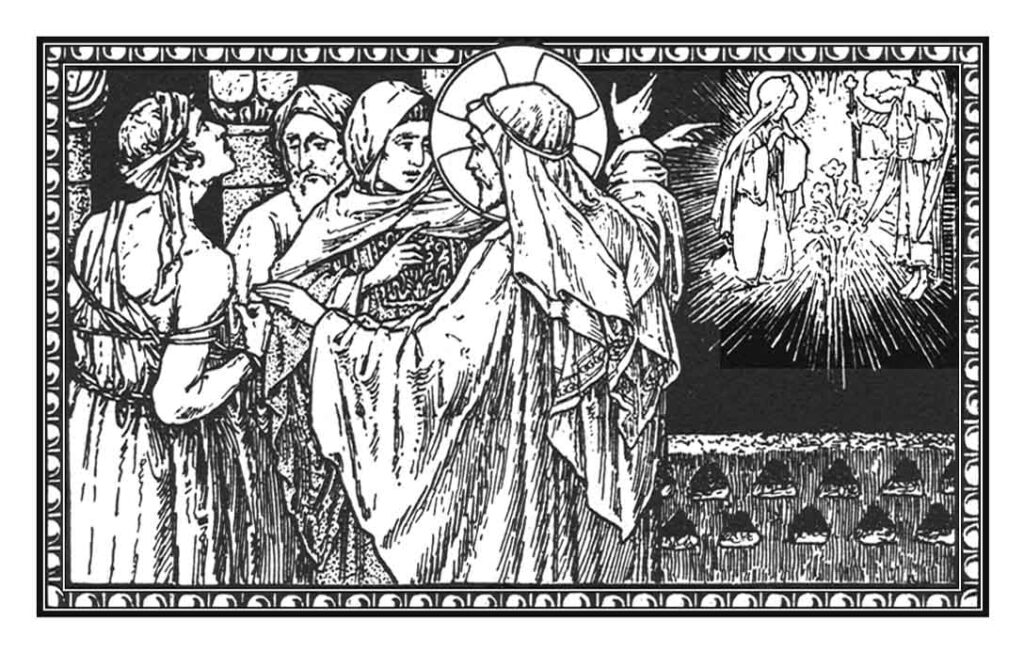
Today we see our Lord in open conflict with Satan, whom He overthrows, disarms, and drives out of a demoniac. This is our Lord’s own explanation which he gave in the form of a parable (Gospel). Satan thought himself secure in his kingdom like the strong man armed guarding the approach to his castle, but the Son of God, stronger than the fallen angel, had come to snatch his unjust conquest from him, and so has acquired us for Himself.
During Lent, which is a time when the struggle against the old man is more intense, we should “live as children of the light, performing actions good, just, and true” (Epistle).
St. Paul is warning us today against sins of the flesh in thought, in word, and in deed. He is warning us not to make anything else our god but God alone. He explains, and he threatens, and in the end he encourages us to give thanks. That’s interesting. Why give thanks as a protection against these sins? Because gratitude requires humility, and humility opens us up to the love of God. Little Thérèse says, “It is the spirit of gratitude which draws down upon us the overflow of God’s grace, for no sooner have we thanked Him for one blessing than he hastens to send us ten additional favors in return.”
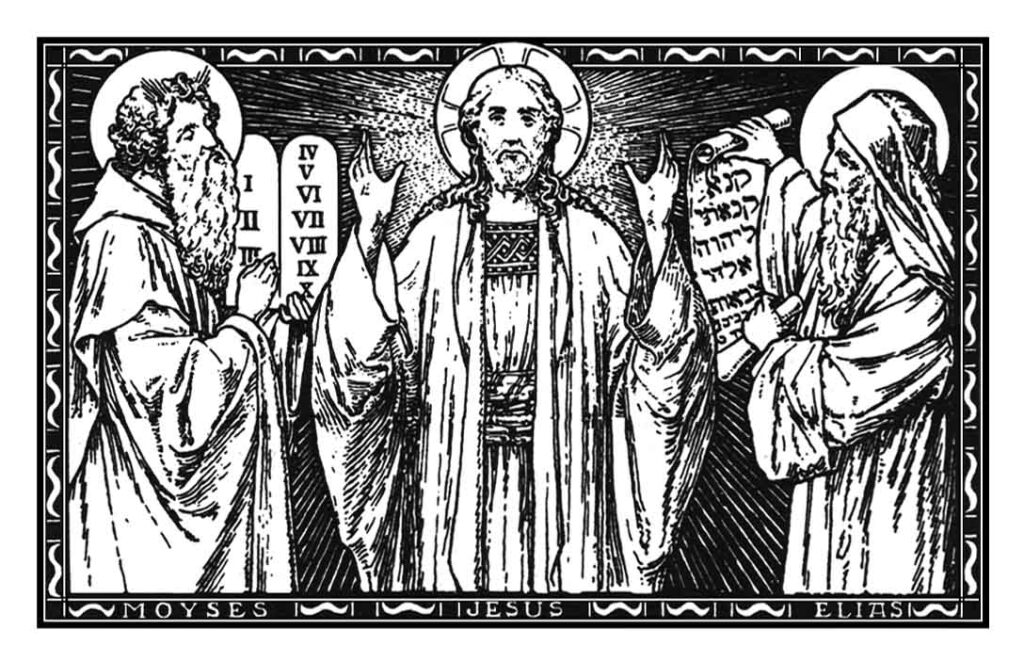
The ordinations of the Saturday in Ember Week began in olden days in the evening, and the present Saturday finished on the Sunday morning. When later a new Mass was composed for the Sunday, the same Gospel was kept.
The Gospel relates the meeting on Mount Thabor of the three who gave us the example of a forty days fast: Moses, Elias, and Jesus.
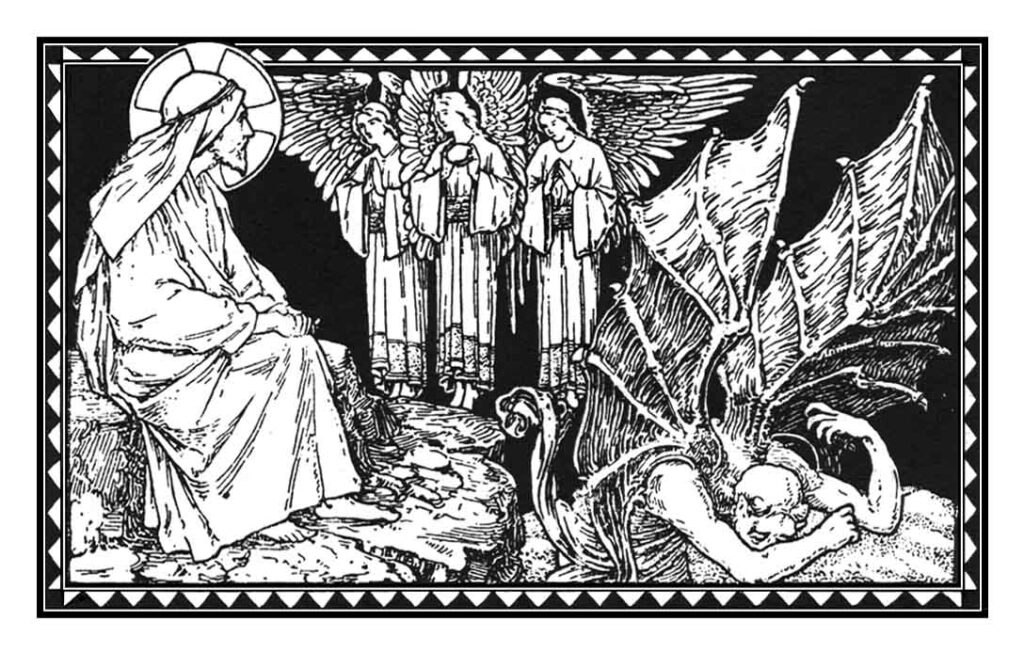
Originally the forty days of penance were counted from the eve of this Sunday to the hour of the Last Supper on Maundy Thursday; then began the celebration of the Paschal mystery, to which the forty days were a preparation.
Our Lord also, after His baptism, began to prepare for His public life by a fast of forty days. He was tempted by Satan, who wished to discover whether the son of Mary was in reality the Son of God (Gospel).
He addresses his first attack to the sense of hunger. In the same way he tries, during the forty days, to make us give up our fasting and mortification. This is the concupiscence of the flesh.
Secondly, the tempter tries to induce Jesus to let Himself be carried by the angels through the air. Satan tempts us by pride, which is opposed to the spirit of prayer and meditation on God’s word. This is the pride of life.
Finally, Satan assures Jesus that he will make Him ruler over all created things. In the same way the devil seeks to attach us to temporal goods, when we ought by almsgiving and works of charity to be helping our neighbors. This is the concupiscence of the eyes or avarice.
As we see, in the Gospel today, our Lord is tempted by the devil. Our Lord, having fasted for forty days and forty nights in the desert, was hungry and alone. And in this moment of human frailty, the devil came along to tempt Him, coaxing Him to show off His Divine power. The Church by selecting this Gospel passage for the first Sunday of Lent shows once again her motherly concern for our spiritual welfare. During the last four days, since Lent began, we all have been tempted probably more than once to give up our good Lenten resolutions and fall back into sin or back into our usual spiritual mediocrity. Let us all, with the help of God, persevere and stay the course.
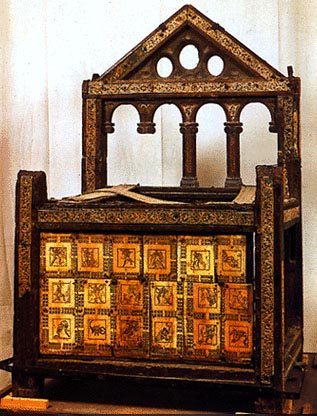
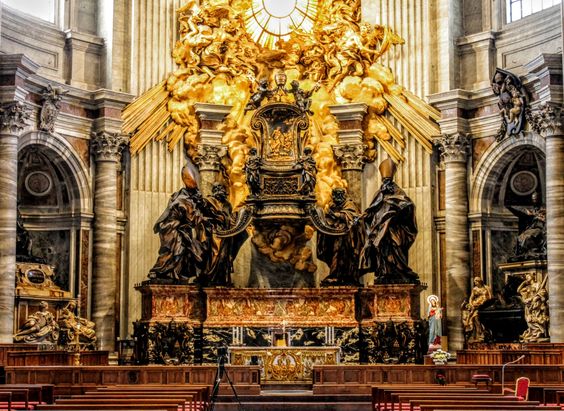
On the Feast of the Chair of St. Peter, February 22, a plenary indulgence is granted under the usual conditions to the members of the Confraternity of St. Peter. The usual conditions are sacramental Confession, Eucharistic Communion, and prayers for the intentions of the Holy Father. For information on how to become a member of the Confraternity, please visit https://www.fssp.org/en/helpus/confraternity-of-saint-peter
To honor the dignity of the “Prince” (Introit) to whom Jesus committed the power of the keys (Collect), the Church instituted the feast of the “Chair of St. Peter1,” which is found in the Roman calendar at this date since the year 336.
As it often falls in Lent, certain churches celebrated it at an earlier date, in January. Hence the two feasts of the Chair of St. Peter, which the Church distinguished by connecting the more ancient one2 on February 22, with the Chair at Antioch and that on January 18 with the Chair of Rome.
1.The cathedra (chair) is the throne established where the bishop resides, hence the name cathedral, given to the church where his seat is placed. Metaphorically, it represents the episcopal authority itself. “The Chair of St. Peter” means therefore, a memory of St. Peter’s episcopate, and his primacy as head of the Church.
2. Rome, until the sixteenth century only celebrated this feast.
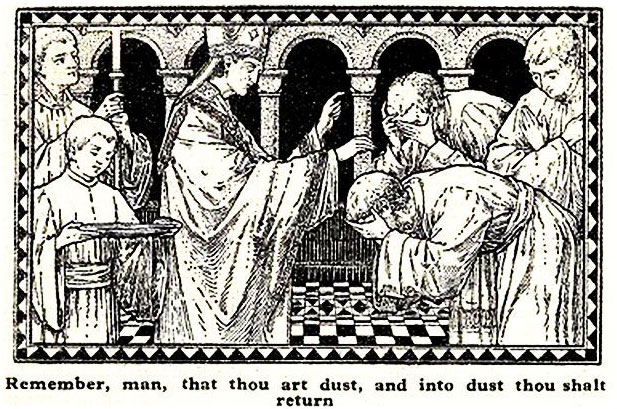
Following the example of the Ninivites, who did penance in sackcloth and ashes, the Church, for the humiliation of our pride and to remind of the sentence of death which we should suffer as the result of sin, today puts ashes on heads saying: “Remember, man, that thou art dust, and into dust thou shalt return.”
It is the remains of an old ceremony. Christians who had committed grave faults were obliged to do public penance. On Ash Wednesday the Bishop blessed the hairshirts which they were to wear during the Forty Days, and sprinkled over them ashes made from the palms of the previous year. Then, whilst the faithful chanted the Seven Penitential Psalms, “the penitents were turned out of the holy place because of their sins, as Adam, the first man was turned out of paradise on account of his disobedience”. They did not enter the church again until Maundy Thursday having won reconciliation by the toil of a forty day’ penance and sacramental absolution. Later on, all Christians, either public or secret penitents, came out of devotion to receive ashes.
The liturgy of today insists on a special way on fasting, the first of the three principal acts of penance.
Please join Catholics around the world today in praying and fasting for peace in Ukraine.
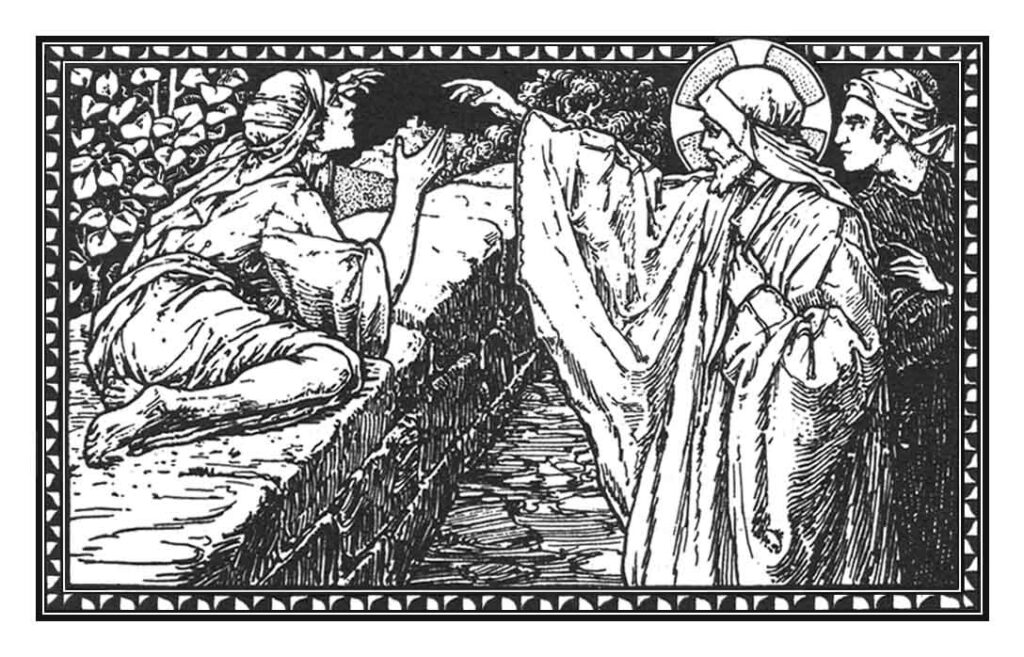
On Quinquagesima Sunday, in the Epistle, the Church places before us the three virtues which we are to work on during the forty days of Lent. St. Paul in his Epistle to the Corinthians says, “There are three virtues, faith, hope, and charity, these three; but the greatest of these is charity.”
The penances which the Church encourages her children to perform during the forty days of Lent, namely prayer, fasting, and almsgiving, free the soul to believe, to hope, and to love God. It does this because these three penances of prayer, fasting, and almsgiving detach us from the things in which we would otherwise put our faith, hope, and love.
At Matins during this week is read the history of Abraham, the “father of true believers”. St. Peter, in whose basilica the Station is held, deserves the same title to a higher degree.
The man born blind, of whom the Gospel tells, is a type of the human race, turned out of Paradise and plunges in the darkness of condemnation.
Jesus, by the merits of His passion, is to open the eyes of men as He did those of the blind man of Jericho, and to give them the light of faith. But faith, of which St. Paul speaks, is as naught without charity (Epistle). The merits of our works, as well as the light which illumines our souls, are in proportion to our charity.
If it is of liturgical origin to grant our souls some relaxation before undertaking the Lenten penance which is imposed on all, let us not forget that the Church condemns all excesses; and for the expiation of such as are committed, let us join in the Forty Hours prayers which Pope Clement XIII (1765) has endowed with many indulgences.

St. Valentine was a holy priest of Rome who was martyred under the Emperor Aurelian in 270. He cooperated in the Savior’s sacrifice and Redemption “by bearing the cross after Him” (Gospel).
Known as the patron saint of couples for his defense of Christian marriage, St. Valentine was martyred by decapitation on February 14. He is the inspiration behind the modern-day celebration of Valentine’s Day.
St. Valentine’s reputation as a patron of couples was not won easily. He lived during one of the most difficult periods of Christian persecution in the early Church. According to most accounts, after a time of imprisonment, he was beaten and then beheaded, likely for his defiance of the emperor’s ban on Roman soldiers marrying.
St. Valentine’s skull can be venerated in the minor basilica of Santa Maria in Cosmedin near the Circus Maximus in Rome. St. Valentine’s relics were reportedly uncovered during an excavation in Rome in the early 1800s, though it is unclear exactly how his skull came to lie in the Byzantine church where it is found today.
In 1964, Pope Paul VI gave Santa Maria in Cosmedin to the care of the patriarch of the Melkite Greek Catholic Church, which is part of the Byzantine Rite.
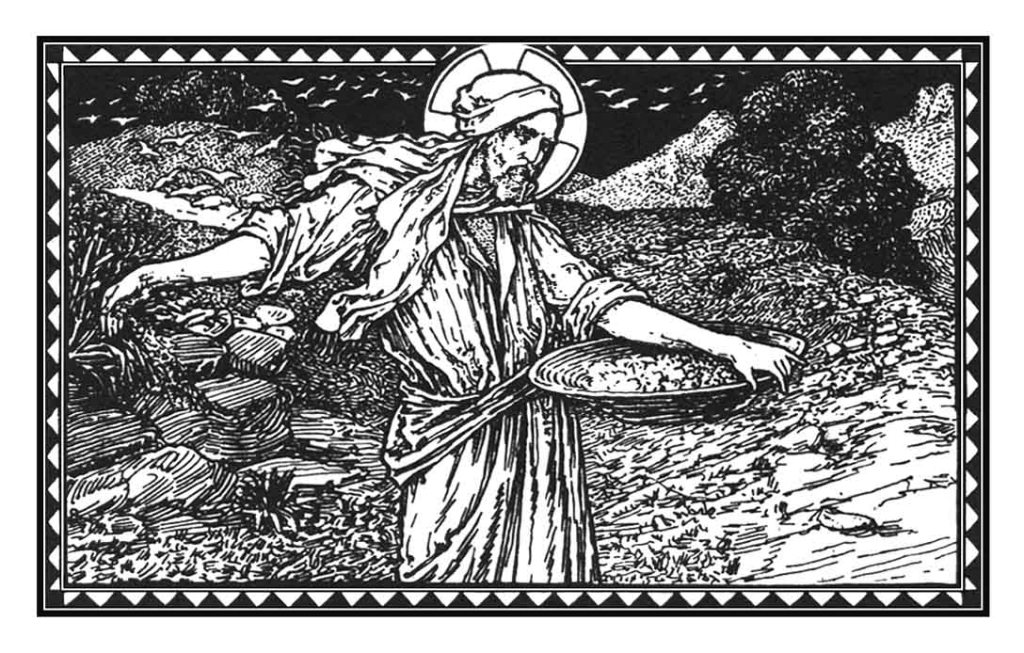
The sexagesima liturgy may be represented in a triptych.
In the center, Jesus, in a boat, on the shores of the Lake of Galilee preaches the Parable of the Sower (Gospel). It is the Redeemer who by His saving doctrine gives life to souls (Collect).
On the left, Noah’s ark floats on the waters of the flood (Matins). It contains the family which is to repopulate the world with believing souls. In the Matins of this week, Noah’s history is read.
On the right, St. Paul faces shipwreck and “the perils in the sea” (Epistle) in order that all nations (Collect) may hear the life-giving word of Christ. The Station being at St. Paul-without-the-Walls his memory occupies a large place in this Mass.
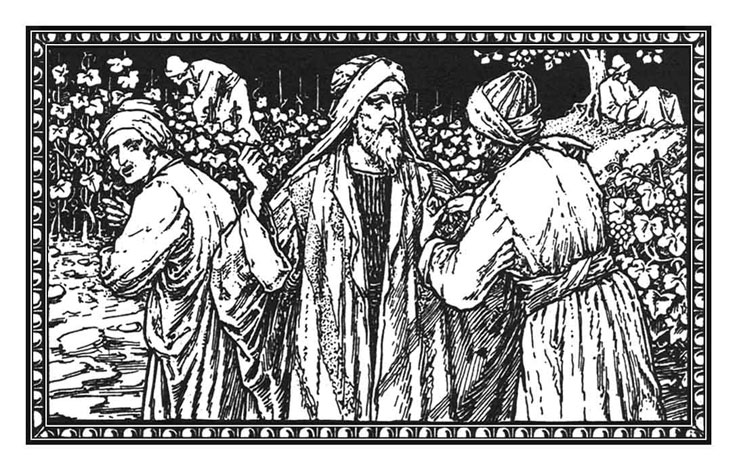
In the Matins of this week, the history of Adam and Eve is read. Man, who is victim of the sin of Adam and of his own, “is justly afflicted” (Collect), “groans and sorrows encompass him” (Introit). Hence St. Paul compares life to an arena where we must fight and mortify ourselves if we wish to obtain the victory (Epistle).
The Gospel in turn shows us that we must all work to obtain the reward, which is eternal life.
The master of the vineyard goes out at all hours. “The morning,” says St. Gregory, “is the period that elapsed from the time of Adam to Noah, the third hour from Noah to Abraham, the sixth hour from Abraham to Moses, the ninth hour from Moses to the coming of the Lord, and at the eleventh hour the Gentiles are called.”
Israel has not answered the call (Epistle)…the Gentiles, the laborers of the last hour, were given the higher place (Gospel).
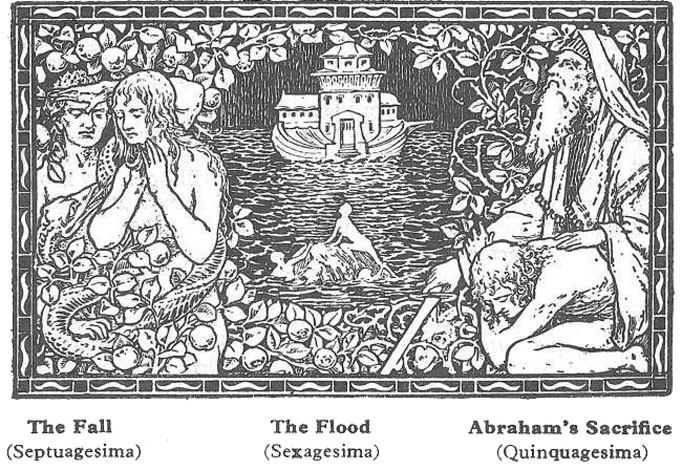
The Septuagesima season always begins with the ninth week before Easter and includes three Sundays called respectively Septuagesima, Sexagesima, and Quinquagesima. These names which were borrowed from the numeral system of the time, denote a series of decades working back from the commencement of Lent, which is known in Latin as Quadragesima. [As the intervals between these Sundays only consist of seven days it is evident that this name must not be taken in a strictly arithmetical sense; but whereas Quadragesima comes exactly at the closing day of the 4th decade before Easter, Quinquagesima (47 days) falls within the 5th decade, Sexagesima (54 days) within the 6th, Septuagesima (61 days) within the 7th.]
This liturgical period is a prelude to Lent and a remote preparation for Easter. It serves as a time of transition for the soul, which must pass from Christmas joys to the stern penance of the sacred forty days. Even if the fast is not yet of obligation, the color of the vestments worn is already violet. As during Advent, the recital of the Gloria in excelsis is suspended, since this hymn which celebrated Christ’s birth in our mortal flesh, is reserved to extol Him when born in His undying Body, i.e. when He rises from the tomb. “Born once of the Virgin, thou art now reborn from the sepulchre,” will then be the cry of the Church. Again the Martyrology introduces Septuagesima Sunday as that on which “we lay aside the song of the Lord which is Alleluia.” “How,” said the people of Israel, “shall we sing the song of the Lord in a strange land?”
This “strange land” is for the people of Christ, the world, which is a place of exile, while Alleluia, the chant St. John heard in heaven, will begin again in the liturgy at Paschaltide, which represents the future life. In the Easter festivities we shall hail our Lord, the conqueror of Satan, who while freeing us from the bondage of sin, will re-open to us the heavenly kingdom. The season of Lent which lasts for forty days (Quadragesima) and that of Septuagesima which is made up of the following periods of ten days (Quinquagesima, Sexagesima, and Septuagesima) may well be taken as representing the seventy years passed by Israel in exile under the harsh captivity of the Babylonians. The chant of Alleluia is silent during this period in which the spirit and very name remind us so strongly, that we are “poor banished children…mourning and weeping in this vale of tears” (Salve Regina).
The Season of Septuagesima ends in the Temporal Cycle on Ash Wednesday. In the Sanctoral Cycle its extreme limit is March 10, that is, when Easter falls on April 25.
- « Previous
- 1
- …
- 6
- 7
- 8
"Listen carefully, my son, to the master's instructions, and attend to them with the ear of your heart. This is advice from a father who loves you: welcome it, and faithfully put it into practice"
~ St. Benedict of Nursia ~
Copyright © 2015-2025 Saint Joseph Catholic Church, Latin Mass Parish, 602 S 34th St., Tacoma, WA 98418. All Rights Reserved.
Website comments or questions: info@saintjosephtacoma.org


